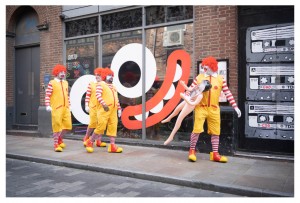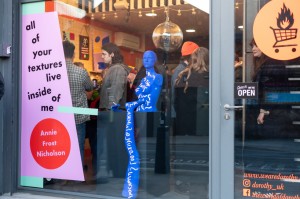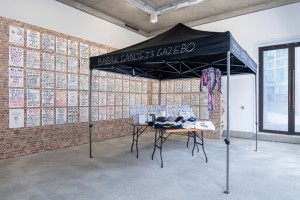“I think the art has to do more” — Introducing: New Turnpike Director, Helen Stalker
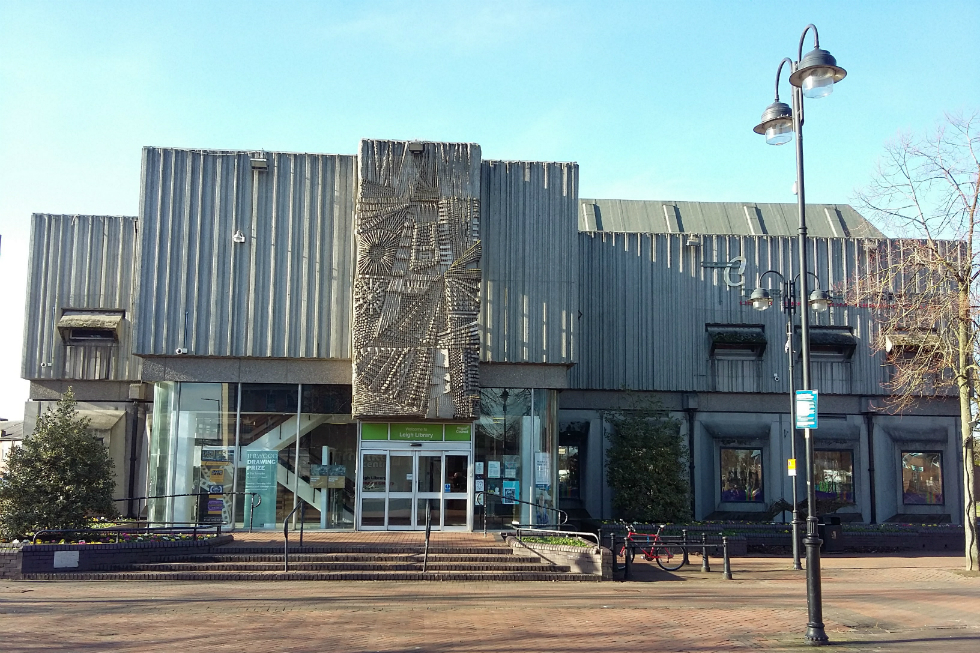
Taking on a small, beleaguered regional gallery might seem an unusual move for someone more used to V&A or Tate. Curator and now Turnpike Director Helen Stalker, finds Denise Courcoux, is up for the challenge: encouraging civic pride in Wigan whilst grappling with squeezed school budgets and closed train stations…
It’s not easy to find a good news story in regional galleries and museums at the moment. Particularly in the North, institutions are closing at an alarming rate, with five Lancashire museums closing in 2016 as a result of enormous pressure from central government on local councils to cut budgets. The Turnpike Gallery in Leigh was a similar casualty when Wigan Council withdrew all funding from it in 2013. However, fast forward to 2017 and it’s just been relaunched with an opening coup as the only Northern venue to host this year’s Jerwood Drawing Prize (January–March 2017, pictured below), and a sparkling programme lined up.
The Turnpike is a striking modernist presence in Leigh, a purpose-built gallery with a huge concrete William Mitchell relief signalling its entrance. Its opening in 1971 coincided with local pit closures and the decline of the town’s mining industry. and the Turnpike’s new Director, Helen Stalker, viewed the gallery’s arrival as a “really bold statement about art and civic pride”. Hosting exhibitions by pivotal 20th century artists such as Henry Moore and Eduardo Paolozzi, its loss in 2013, following Wigan’s Drumcroon Art Gallery, was a huge blow for the borough: “there was very little to start with, and then there was nothing”.
Following its closure, a local volunteer-led organisation assumed responsibility for the gallery, and through an Esmée Fairbairn grant it was able to recruit an arts professional last year. Working as a Curator at the Whitworth in Manchester, and with roles at Tate Liverpool and the V&A under her belt, taking on a small, beleaguered regional gallery might seem an unusual move to say the least, but Stalker could see its potential. Crucially, she also shared the sense of civic pride that drove its original opening; as her local gallery, it offered the opportunity to create “something for the community that you’re part of and where your child goes to school”.
Leigh’s young people are central to Stalker’s vision for the future of the gallery. Local authority cuts haven’t just hit the cultural sector, but also arts education, and she sees The Turnpike as a place that can help plug the gap created by squeezed school budgets, through bringing professional artists into schools and offering extra-curricular provisions.
“What we want to do at The Turnpike is introduce young people and the community to the best art, on a smaller scale obviously, but the very best that we can bring to Leigh”, Stalker says. “That will hopefully inspire and raise the aspirations of people, and also give them a sense of entitlement to culture, so they believe it’s for them. It’s a centre of excellence but with the community at its heart.”
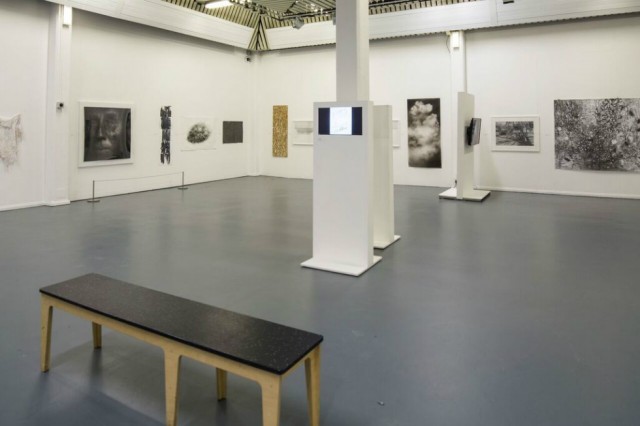
This provision of essential services has, ironically, meant The Turnpike has been able to secure three years’ core Community Interest Funding from Wigan Council to enable it to achieve its objectives, as well as a sustainable future beyond that – a gesture that Stalker considers a real endorsement of the transformative power of the arts, especially in such straitened times for local authorities.
So how does curating an arts programme in Leigh differ from curating an arts programme in Manchester or Liverpool? Though the geographical distance between them is small, Leigh’s train station has been closed for almost 60 years, and Stalker sees the lack of public transportation as distancing it not only physically but also psychologically from its neighbouring big cities. Though suffering from the pockets of deprivation that take root in towns suddenly bereft of a local industry, Stalker describes Leigh as a fiercely independent, community-focussed place. This local identity is informing her approach to programming The Turnpike.
“I think the art has to do more”, she notes. “The overall feel for the programming of the place is the art will resonate in some capacity with the community already – and that’s not me predicting what the community know, or what they’re interested in. There’s just going to be something that speaks to the heritage or the identity of the locality. So the arts programming in a sense is going to be shaped by the town, but hopefully the arts programme will then shape the town.”
Having secured funding, the next couple of months will be an intensive period of essential groundwork for the gallery. The Turnpike’s next exhibition, opening on 10 June, will be of Mark Leckey’s autobiographical film Dream English Kid (June–August 2017, pictured below) – one of the standout works of the 2016 Liverpool Biennial. Part of the Biennial’s new Touring Programme which gives life to artistic commissions beyond the festival, it is an inspired choice for the Turnpike with the “resonance” that Stalker is hoping to bring to the arts programme.

Growing up in Ellesmere Port, on the edge of Liverpool looking in, music was hugely influential to Leckey, as it is to many around Northern Soul’s Wigan heartland. The spark for the film was his discovery on YouTube of audio of a Joy Division gig he had attended at Liverpool punk club Eric’s, as a teenager in 1979. In a brilliant bit of local legend, that same year Joy Division played the first and only Leigh Rock and Music Festival along with such post-punk luminaries as Echo and the Bunnymen and The Teardrop Explodes – the result of Tony Wilson and Bill Drummond agreeing to literally meet in the middle of Manchester and Liverpool.
“So they brought all their acts and they had this festival on a piece of wasteland that the local Leigh youth club organised, and nobody I speak to ever went! It’s this piece of mythology; there was a bus strike that day so hardly anyone turned up.”
It has been a tumultuous few years for The Turnpike, but Stalker has absolute conviction in the need for lateral thinking to enable it and organisations like it to survive.
“When local authorities can’t do things, culture’s really going to suffer. It’s about how we fill those voids, these vacuums that have been left behind, or are potentially going to be created. I feel like we’re at a time of a new model of provision. We’re needed more than ever – these arts organisations, they’re needed more than ever.”
Denise Courcoux
Follow The Turnpike’s upcoming programme – including a screening of Captain Fantastic (2016) on 28 April 2017, and Mark Leckey ‘s Dream English Kid from 10 June –27 August 2017 – on their website and on Twitter @TheTurnpike1
Images, from top: The Turnpike 2017, credit Denise Courcoux; Jerwood Drawing Prize 2016 at The Turnpike: Jan–March 2017, credit Alex Horrocks; Mark Leckey, Dream English Kid, 1964 – 1999 AD, 2015, photo courtesy of the artist and Cabinet London



